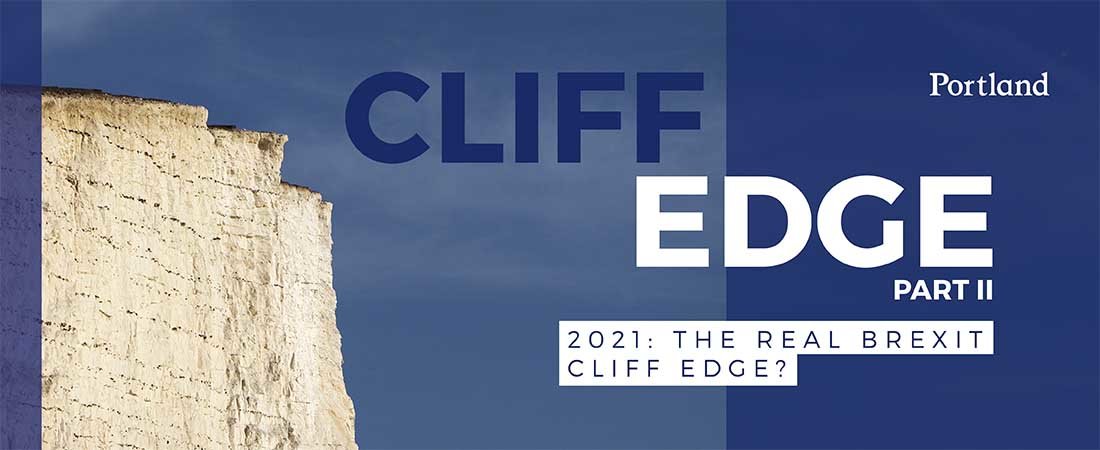This morning, Portland’s Victoria Dean was joined by Deborah Mattinson (Founder of Britain Thinks), Peter Foster (Europe Editor of the Daily Telegraph) and HE Amb. Alexandre Fasel, (Swiss Ambassador to London) to discuss how the British Government might approach the inevitable trade-offs between sovereignty and market access and what businesses should do to prepare for the possibility of a new cliff-edge scenario at the end of a transition period.
Here are our five key takeaways from the experts.
- Everything’s changed, but nothing’s changed
This week brought embarrassment for Theresa May. Her Government was found in contempt of Parliament and forced to release its Brexit legal advice, and she effectively lost control of her deal’s passage through parliament with the success of Dominic Grieve’s amendment.
This radically changes the Westminster politics of Brexit. The Grieve amendment will give all sides pause for thought – if not the Prime Minister’s deal, then what? For those who want a harder Brexit, the other options on the table look softer. For those who want a softer Brexit, it’s clear that the EU took a risk with this deal and will drive a hard bargain if the UK seeks to renegotiate, which may leave them with something harder.
But, the basic trade-off of rights and obligations on which the future relationship will be built remain the same. A central problem also remains: Theresa May has failed so far to confront the public, and MPs, with the reality of these trade-offs. With the 29th March looming, expect these confrontations – and larger political questions about the fallacy and reality of the ideals at stake – to be forced.
- Brexit is the new normal
The UK can learn a thing or two from third countries about life on the outside. For one, the turbulence of the Brexit negotiations will only continue after the UK leaves the EU. Given the ever-evolving nature of the bloc, third countries are caught up in a constant negotiation, rebalancing principles of market access against sovereignty with every rule and power change. With the negotiating power of the EU vastly outweighing that of single countries, the UK might find this dance is one-sided.
The constant state of lopsided negotiation and politicking that come with third party status after Brexit, could, however, give the nation a common enemy – and therefore common ground.
The UK will encounter a cycle of frustrating negotiations with a more powerful negotiating partner punctuated by the occasional mutually beneficial agreement, which could build up a content but sceptical attitude toward the EU. Switzerland saw a similar trend following the 1992 EEA referendum, where the margins were similarly slim (49.7% vs 50.3%) between support for and against membership. Ten years later, a majority closer to 80% rejected EU membership.
- Brexit will shift the foundations of British politics
The conclusion among politicos, academics and talk show hosts alike that the referendum vote was a symptom of deep-seated social divisions may have some interesting consequences for the shape of the British political system.
At the height of November’s negotiations, everyone agreed that unity is badly needed to heal these divisions, yet no one was willing to make concessions.
How Westminster now moves forward with Brexit, which divides people along lines like age, gender and geography rather than along traditional political boundaries, may change how Westminster itself functions. If the Prime Minister’s withdrawal deal (or something similar) is accepted, it will be because of concessions on the part of a number of parties. This in turn may lead the adversarial two-party system to dissolve into a more complex landscape where power is shared among more tribes and along different lines. If the deal is rejected, however, the jury is out on what British politics will look like in 2021 and beyond.
- People aren’t ‘bored of Brexit’ – it’s just confusing
Recent polls about the Brexit deal reveal conclusive…confusion. ComRes tells us that people would prefer a second referendum to Theresa May’s deal, but also that they are opposed to a second referendum. People don’t think we should seek to remain in the UK, except in another Deltapoll survey where they do.
With both surveys and Brexit, the devil is in the details – it all depends on what the other options are. But we shouldn’t be too quick to diagnose the nation as “bored of Brexit” as foreign secretary Jeremy Hunt has done. Survation surveys showed that in just ten days in November, the number of people who had heard about the Government’s withdrawal agreement, and support for it, went up among all groups. This suggests it’s confusion – and perhaps pragmatism – are the real sentiments of the nation.
- If you think politics is nasty now…
On home turf, the politicking around Brexit has peaked after two years of negotiations. Naturally, any deal the Prime Minister brought home was going to draw fire, but we’re bound to see this escalate as politicians face hard decisions on trade and regulation, which inherently mean unpopular trade-offs between sectors and priorities domestically.
With an increasingly confused and frustrated electorate, rhetoric is still circling around phrases like “take back control”, and MPs and the Government aren’t likely to change tack. After all, it would be a brave politician who campaigned on a slogan of “it’ll be a long, hard slog” – but that’s exactly the honesty that could cut through the confusion that many people feel.

